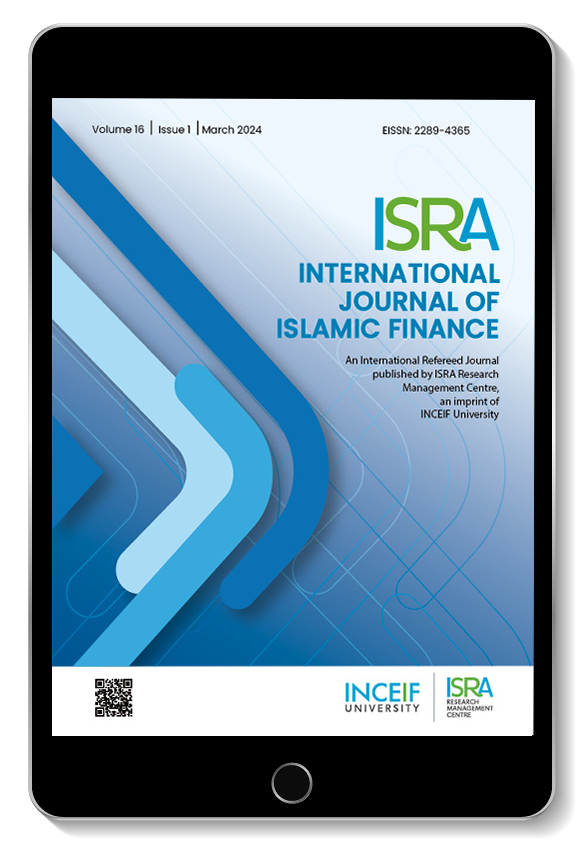发展伊斯兰教法指数的排名方法:以Borsa Istanbul为例
IF 2.8
Q2 BUSINESS, FINANCE
引用次数: 0
摘要
本文旨在为土耳其伊斯兰指数中包含的公司开发一种排名方法。因此,本文简化了对股票市场投资具有伊斯兰敏感性的投资者在构建投资组合时的决策过程。设计/方法/方法本文对20家在伊斯坦布尔证券交易所上市的公司进行了案例研究,并从其2017年、2018年和2019年的财务报告中提取了数据。这些公司根据其与土耳其Ziraat Katilim指数使用的筛选标准的兼容性进行评分和排名。此外,本文采用定量筛选的方法来计算这些公司的排名分数。调查结果显示,一些公司与筛选标准高度契合,排名得分接近100分。然而,一些公司勉强满足了标准。对一些投资者来说,这可能不是一个理想的结果。研究局限/启示仅20家公司被纳入分析。由于土耳其使用的是传统会计制度,因此很难从财务结果中获得有关公司是否符合伊斯兰教法的确切信息。实际意义研究结果有助于投资者确定在伊斯兰框架内哪家公司比其他公司在道德上更负责。这对相关公司、指数提供商和伊斯兰教法学者也有影响。社会意义研究结果旨在简化对证券市场投资具有伊斯兰敏感性的投资者在构成投资组合时的决策过程。原创性/价值据作者所知,这是为土耳其伊斯兰教法筛选股票开发排名方法的首批尝试之一,尽管伊斯兰教法筛选自上世纪90年代末以来一直提上日程。并根据11个指标的筛选标准对其进行了比较。本文章由计算机程序翻译,如有差异,请以英文原文为准。
Developing a ranking methodology for Shari’ah indices: the case of Borsa Istanbul
Purpose
This paper aims to develop a ranking methodology for the companies included in the Islamic indices in Turkey. Thus, this paper simplifies the decision-making process for investors with Islamic sensitivities to stock market investment when constructing their investment portfolio.
Design/methodology/approach
This paper uses a case study of 20 companies listed on Borsa Istanbul, drawing data from their 2017, 2018 and 2019 financial reports. These companies are scored and ranked according to their compatibility with the screening criteria used by Ziraat Katilim index in Turkey. In addition, this paper uses the quantitative screening process to calculate the ranking scores of these companies.
Findings
The findings show that some companies are highly compatible with the screening criteria, with ranking scores close to 100 points. However, some companies satisfied the criteria on the margin. This may not be a desirable result for some investors.
Research limitations/implications
Only 20 companies are included in the analysis. Since the conventional accounting system is used in Turkey, it was difficult to get exact information about the companies’ Shari’ah compatibility from the financial results.
Practical implications
The findings assist investors to determine which company is ethically more responsible than others within the Islamic framework. There are also implications for the companies in question, index providers and Shari’ah scholars.
Social implications
The findings aim to simplify the decision-making process of investors who have Islamic sensitivities to stock exchange market investment when they constitute their portfolio.
Originality/value
To the best of the authors’ knowledge, it is one of the first attempts to develop a ranking methodology for Shari’ah-screened stocks in Turkey even though Shari’ah screening has been on the agenda since the late 1990s. This paper also compares 11 indices based on their screening criteria.
求助全文
通过发布文献求助,成功后即可免费获取论文全文。
去求助
来源期刊

ISRA International Journal of Islamic Finance
BUSINESS, FINANCE-
CiteScore
3.40
自引率
17.40%
发文量
18
审稿时长
20 weeks
期刊介绍:
It is the aspiration of the editorial committee that IJIF achieves the highest rank in quality and substance. It is thus our aim that the journal be carried in the Thompson Reuters’ ISI and Scopus databases. By ensuring high standards in articles published in Islamic finance we ensure that further innovation and research is carried out and promoted in the Islamic finance industry and academia. IJIF publishes 2 issues per annum.
 求助内容:
求助内容: 应助结果提醒方式:
应助结果提醒方式:


